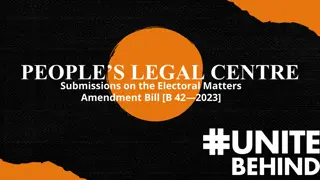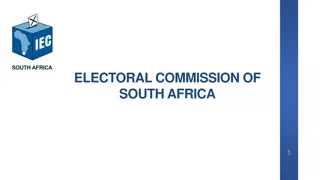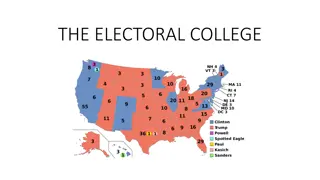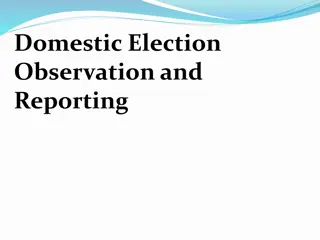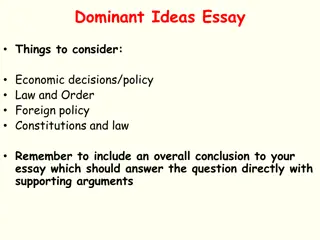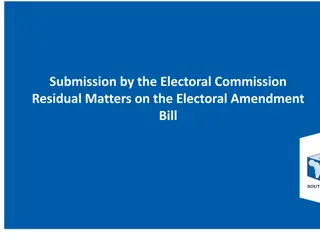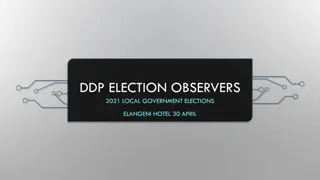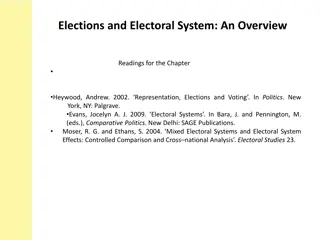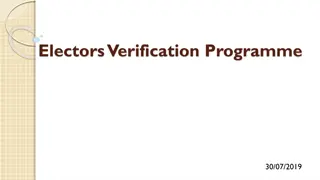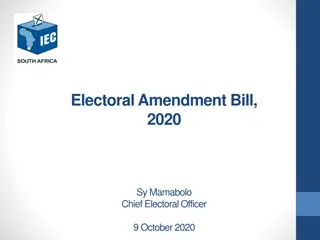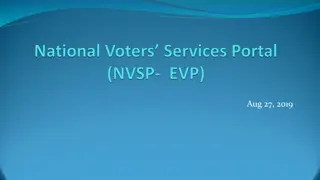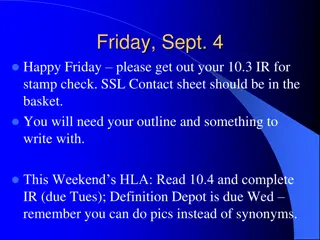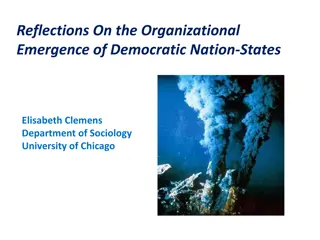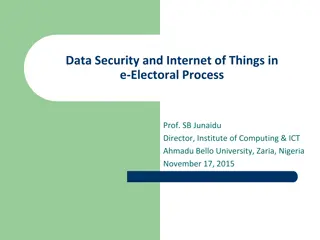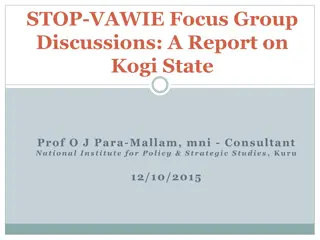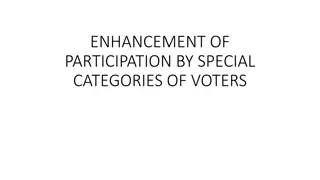Enhancing Democratic Electoral Processes in Africa: Challenges and Solutions
Democratic electoral processes in Africa must strive to be inclusive, transparent, and accountable to promote public confidence. The importance of independent and professional electoral governance institutions is emphasized to address the legitimacy crisis facing elections today. The SADC Secretariat's commitment to free, fair, transparent, credible, and peaceful elections as per SADC Principles is highlighted, emphasizing the key variables to ensure electoral integrity.
Uploaded on Sep 16, 2024 | 4 Views
Download Presentation

Please find below an Image/Link to download the presentation.
The content on the website is provided AS IS for your information and personal use only. It may not be sold, licensed, or shared on other websites without obtaining consent from the author.If you encounter any issues during the download, it is possible that the publisher has removed the file from their server.
You are allowed to download the files provided on this website for personal or commercial use, subject to the condition that they are used lawfully. All files are the property of their respective owners.
The content on the website is provided AS IS for your information and personal use only. It may not be sold, licensed, or shared on other websites without obtaining consent from the author.
E N D
Presentation Transcript
PROF. K.I. THELETSANE DIRECTOR OF THE ORGAN, DIRECTORATE ON POLITICS, DEFENCE AND SECURITY AFFAIRS SADC SECRETARIAT Presentation by the SADC Secretariat
Introduction Democratic electoral processes should be inclusive, transparent, accountable, and designed to promote public confidence African elections vary widely in their adherence to these principles Establishing a network of independent and professional institutions of electoral governance is critical to advancing democratization Elections are now facing a deep crisis of legitimacy Fraud and manipulation.
Introduction It has become a culture in Africa - democracy is measured, among others by elections Some states in Africa are known for timely and consistent elections Illegitimate and often characterised by violence and the abuse of human rights The same states might also present various other features for democracy and yet still fail to pass the test Elections have failed to be a credible measure of democracy outside of other features
FREE, FAIR, TRANSPARENT, CREDIBLE AND PEACEFUL DEMOCRATIC ELECTIONS In line with the SADC Principles and guidelines, the leadership of SADC EMBs shall work professionally and independently from Government influence to adhere to the following key variable on SEOM observation: Free elections - means fundamental human rights and freedoms are adhered to during electoral processes, including freedom of speech and expression of the electoral stakeholders; and freedom of assembly and association; and that freedom of access to information and right to transmit and receive political messages by citizens is upheld; that the principles of equal and universal adult suffrage are observed, in addition to the voter s right to exercise their franchise in secret and register their complaints without undue restrictions or repercussions.
FREE, FAIR, TRANSPARENT, CREDIBLE AND PEACEFUL DEMOCRATIC ELECTIONS Fair elections - means electoral processes that are conducted in conformity with established rules and regulations, managed professional and competent Electoral Management Body (EMB); in an atmosphere characterised by respect for the rule of law; guaranteed rights of protection for citizens through the electoral law and the constitution and reasonable opportunities for voters to transmit and receive voter information; defined by equitable access to financial and material resources for all political parties and independent candidates in accordance with the national laws; and where there is no violence, intimidation or discrimination based on race, gender, ethnicity, religious or other considerations specified in these SADC Principles and Guidelines Governing Democratic Elections. by an impartial, non-partisan
FREE, FAIR, TRANSPARENT, CREDIBLE AND PEACEFUL DEMOCRATIC ELECTIONS CONT Transparent - means elections are operated in an open, clear, visible and unhindered manner. Credible elections - means electoral processes enjoy considerable support and confidence of the citizenry and international or regional community, leading to mutually agreeable results from competing entities that participate actively in the electoral process. Peaceful - means electoral processes are punctuated by calm; are undisturbed and untroubled by violence or intimidation; are conflict-free and generally exude an atmosphere where all citizens are free and unhindered to express their right to vote; are able to offer themselves without intimidation for election, communicate freely their electoral choices; and enjoy freedom of assembly and association.
Democracy Many claim to know democracy yet it is misunderstood and misused Many leaders claim to be practising forms of democracy specific to their political, social and cultural practices They claim a championship to democracy Leaders believe that democracy is all about elections They never value other factors as defined by various governance scholars and practitioners Holding elections, no matter their quality and acceptability, is what people desire and expect in a real democracy.
Election Management Bodies and Elections The legal and financial framework for elections should guarantee the independence of election commissions The process of choosing election commissioners - inclusive and transparent process Integrity and professionalism - key qualifications for nominees to serve on election commissions
Election Management Bodies and Elections Challenges faced by EMBs Lack of funding Maintaining security is often a concern, and election commissions may have to rely on security services that are viewed with suspicion by the public Political parties not accepting the results Irresponsible comments by observers who fail to follow international standards Observation, lack of sufficient knowledge of the country s context, or visit only a few polling stations can throw the credibility of an election into doubt
Election Management Bodies and Elections Way forward of EMBs Election commission decisions impact all political parties and other stakeholders Regular engagement with all electoral actors can increase their acceptance of the electoral process Collaborated actively with stakeholders, including establishing standing relationships with political parties, media outlets, civil society organizations, faith-based organizations, security services, and the judiciary This collaboration improves the electoral process and eases tensions Different mechanisms for nominating election commissioners,
Election Management Bodies and Elections Way forward of EMBs Conflict of interest can arise when a president or political party nominates EMB members EMBs should be named through inclusive, transparent processes with checks and balances Election commissioners must have a mandate to make independent decisions, and they must have the space and means to do their work Legal frameworks can be used to prevent executive branch manipulation of election commission decisions
Kea Leboha Thank You Merci Obrigado
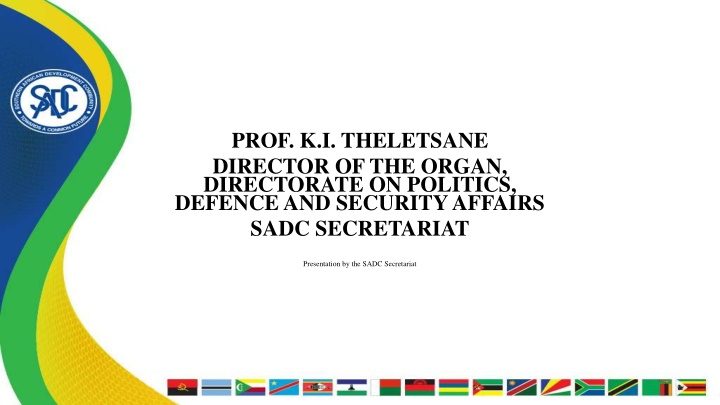

![RE: ELECTORAL MATTERS AMENDMENT BILL [ B42-2023]](/thumb/18837/re-electoral-matters-amendment-bill-b42-2023.jpg)

